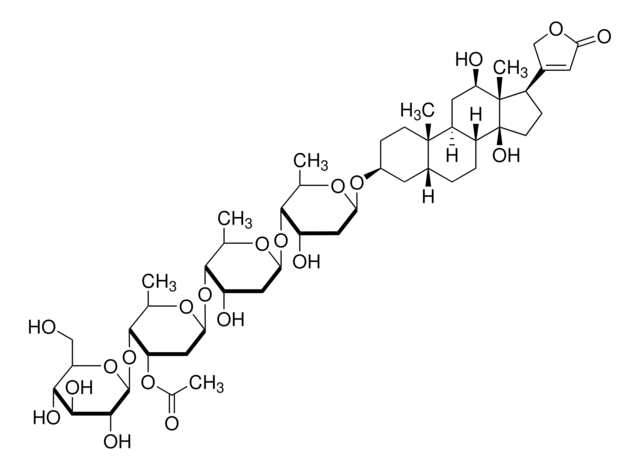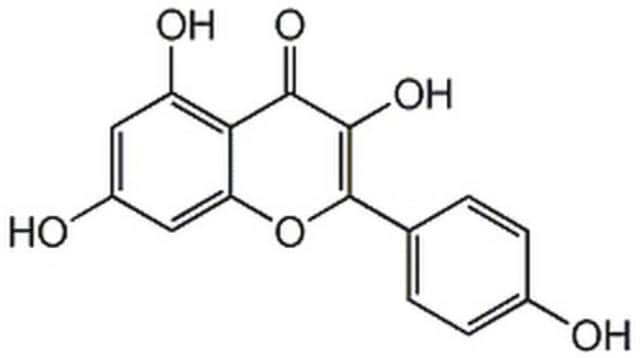H125
Harmalol hydrochloride dihydrate
monoamine oxidase inhibitor
Sign Into View Organizational & Contract Pricing
All Photos(1)
About This Item
Empirical Formula (Hill Notation):
C12H12N2O · HCl · 2H2O
CAS Number:
Molecular Weight:
272.73
EC Number:
MDL number:
UNSPSC Code:
12352200
PubChem Substance ID:
Recommended Products
drug control
regulated under CDSA - not available from Sigma-Aldrich Canada
mp
264-267 °C (dec.) (lit.)
SMILES string
Cl[H].[H]O[H].[H]O[H].CC1=NCCc2c1[nH]c3cc(O)ccc23
InChI
1S/C12H12N2O.ClH.2H2O/c1-7-12-10(4-5-13-7)9-3-2-8(15)6-11(9)14-12;;;/h2-3,6,14-15H,4-5H2,1H3;1H;2*1H2
InChI key
OYKGNQNESCZSHQ-UHFFFAOYSA-N
Biochem/physiol Actions
Harmalol, a harmala (β-carboline) alkaloid, is a monoamine oxidase inhibitor (MAOi) useful for studies involving melanogenesis. Harmalol is use in β-carboline nucleic acid (DNA and RNA) binding studies.
Storage Class Code
13 - Non Combustible Solids
WGK
WGK 3
Flash Point(F)
Not applicable
Flash Point(C)
Not applicable
Personal Protective Equipment
dust mask type N95 (US), Eyeshields, Gloves
Choose from one of the most recent versions:
Already Own This Product?
Find documentation for the products that you have recently purchased in the Document Library.
Ji-Hyun Im et al.
Vascular pharmacology, 50(5-6), 147-152 (2008-12-17)
Beta-carboline alkaloids including harmalol, harmaline, norharmane, harmol, harmine and harmane are important constituents of the medicinal plant, Perganum harmala L. (Zygophylaceae), which has been used in traditional medicine. In the present study, the antiplatelet activities of six beta-carboline alkaloid compounds
K T Douglas et al.
Molecular pharmacology, 23(3), 614-618 (1983-05-01)
The ionization and UV-visible spectral properties of some harmala alkaloids have been investigated spectrophotometrically. Harmaline and harmine were found to have pKa values of 9.55 +/- 0.04 and 7.45 +/- 0.03, respectively. The ionization of harmalol was characterized by two
D H Kim et al.
The European journal of neuroscience, 13(10), 1861-1872 (2001-06-14)
The present study elucidated the protective effect of beta-carbolines (harmaline, harmalol and harmine) against oxidative damage of brain mitochondria, synaptosomes and PC12 cells induced by either dopamine or 6-hydroxydopamine. Harmaline, harmalol and antioxidant enzymes (superoxide dismutase/SOD and catalase) decreased the
C S Lee et al.
Journal of neurochemistry, 75(2), 521-531 (2000-07-19)
The present study elucidated the protective effect of beta-carbolines (harmaline, harmalol, and harmine) on oxidative neuronal damage. MPTP treatment increased activities of total superoxide dismutase, catalase, and glutathione peroxidase and levels of malondialdehyde and carbonyls in the basal ganglia, diencephalon
T A Al-Alaf et al.
Journal of inorganic biochemistry, 38(1), 47-56 (1990-01-01)
The preparation of novel biologically active platinum(II) and palladium(II) complexes of some beta-carboline alkaloids (harmaline, harmalol, harmine, and harmane) is described. These complexes, characterized on the basis of their CHN elemental analysis, infrared, Raman and 1H and 13C nuclear resonance
Our team of scientists has experience in all areas of research including Life Science, Material Science, Chemical Synthesis, Chromatography, Analytical and many others.
Contact Technical Service







